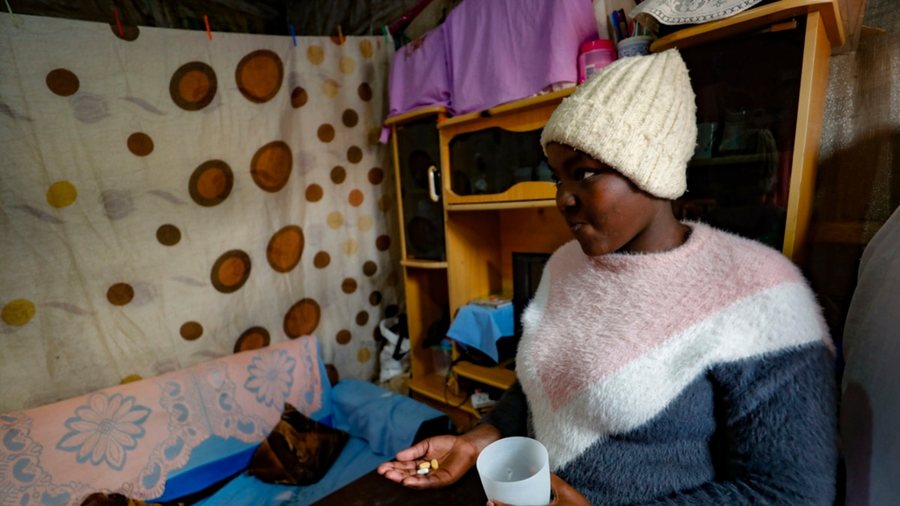
The State Department sought to clarify President Donald Trump's order to freeze and review U.S. development aid to other countries. Meanwhile, the top U.S. diplomat sought to calm the confusion by issuing an emergency order to protect a key AIDS program from a 90-day suspension.
At the White House, President Trump said that the suspension of funds for aid programs at home and abroad is part of the administration's efforts to root out "extraordinary waste and theft and abuse."
The order issued late Tuesday by Secretary of State Marco Rubio excludes humanitarian aid, which he classifies as "life-saving medicine, medical services, food, shelter and assistance to ensure a minimum standard of living, as well as the administrative costs and supplies necessary to enable this assistance."
The United Nations Programme on AIDS welcomed the development, highlighting the value of the United States President's Emergency Plan for AIDS Relief, or PEPFAR, a program that serves 20 million people in 55 countries.
“UNAIDS welcomes this exemption from the US government, which ensures that millions of people living with HIV can continue to receive life-saving medicines while reassessing US development assistance to other countries,” said Executive Director Winnie Byanyima. “This urgent decision recognizes PEPFAR’s vital role in the AIDS response and restores hope for people living with HIV.”
Blocking programs that do not align with the “America First” agenda
In a memo sent to reporters on Wednesday, the State Department explained the rationale for freezing funds during the program review and praised early cost cuts, saying that "even at this early stage, over $1,000,000,000 in spending inconsistent with an America First agenda has been prevented."
The United States spent about $70 billion on aid to other countries during 2023, according to the latest available data.
"We are rooting out the waste," the memo said. "We are blocking programs and exposing activities that conflict with our national interests. None of this would be possible if these programs were allowed to continue automatically."
The president, who said Wednesday at the White House that he "could stay all day" and give examples of fraud and abuse in the US government, highlighted some of them.
"We identified and stopped $50 million being sent to Gaza to buy condoms for Hamas," he said. "Fifty million. And you know what happened to them? They used them as a method to make bombs. How do you feel about that?"
The State Department echoed this, saying in a statement: "Without the pause, American taxpayers would have provided condoms [and other contraceptive services] in Gaza, marketing and climate justice services in Gabon, clean energy programs for women in Fiji, gender development programs in DC, family planning throughout Latin America, sex education and pro-abortion programs for young girls around the world, and much more. These types of programs do not make America stronger, safer, or more prosperous."
A day earlier, the State Department sent a memorandum citing examples of inappropriate projects, including $102 million to fund the humanitarian and nonprofit work of the International Medical Corps in war-torn Gaza.
A USAID report says the agency spent a total budget of about $7 million on male condoms and about $1 million on female contraceptives in fiscal year 2023. In total, the agency said it distributed about 138 million male condoms and 1.7 million female contraceptives worldwide.
According to the report, under the direction of USAID, the main administrative agency for funds that the United States provides for development in other countries, the bulk of the contraceptive items were sent to African countries. Jordan was the only country in the Middle East to receive such a shipment, with intravenous contraceptives and pills worth $45,680.
In Congress, lawmakers not only affirmed the need for accountability, but also emphasized that Congress, not the White House, decides how American taxpayer money is spent.
"I think it's appropriate to have a review," said Republican Senator Kevin Cramer, of North Dakota.
"However, it would be my hope that the aid could be reactivated and go to Ukraine," said Senator Cramer. "And then we'll see in the next budget cycle whether or not Congress has the will to continue that aid."
"This is a dramatic overreach by the White House and the president," said Democratic Senator Mark Kelly of Arizona. "It's unprecedented, it's unsolicited. This is money that we authorized in our role as members of the Senate and the House of Representatives." VOA (A2 Televizion)











